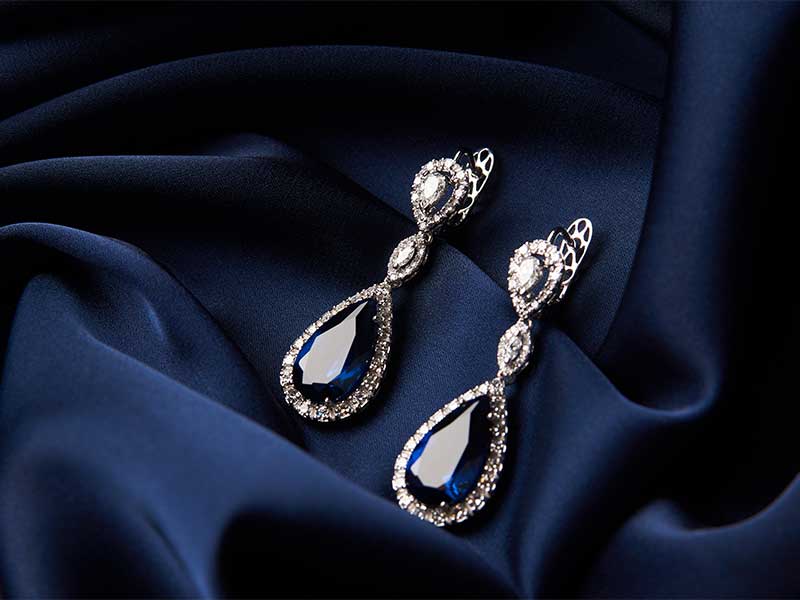Revealing the Rich Background Behind Exquisite Estate Jewelry Parts
The exploration of beautiful estate fashion jewelry items introduces a rich tapestry of background, reflecting the societal worths and imaginative motions of their time. From their origins as markers of riches amongst the elite to their makeover into valued household heirlooms, these items personify stories that transcend generations. Each historic age introduces distinct layout attributes and social impacts that add to their attraction. As we analyze the complex details and provenance of these pieces, one have to consider the extensive stories they hold-- tales that may test our understanding of appeal and value worldwide of precious jewelry.
The Beginnings of Estate Fashion Jewelry
The beginnings of estate fashion jewelry can be traced back several centuries, mirroring an abundant tapestry of cultural and historical impacts. Precious jewelry offered as a symbol of wealth and condition amongst aristocrats and the aristocracy. As different civilizations emerged, one-of-a-kind styles and strategies progressed, commonly linked with the traditions and beliefs of their particular societies.

As cultures progressed, estate fashion jewelry began to represent even more than plain adornment; it became a type of personal expression, with pieces usually gave through generations. This transfer of possession imbued each product with stories and memories, better enhancing its value. Hence, estate fashion jewelry includes a myriad of impacts, enveloping the essence of human experience, creativity, and history, making it a significant element of the jewelry world today.

Noteworthy Historic Ages
Throughout history, numerous periods have actually significantly affected the layout and value of estate precious jewelry. Each duration generated distinct styles, products, and social contexts that shaped the virtuosity of jewelry-making.
The Victorian period (1837-1901) marked a profound shift in fashion jewelry design, defined by enchanting themes and elaborate craftsmanship. During this time around, precious jewelry frequently signified personal view and was regularly utilized to commemorate significant life events. The Art Nouveau movement (1890-1910) adhered to, highlighting natural forms and flowing lines, attracting ideas from nature and the human number.
The Roaring Twenties heralded the Art Deco duration (1920-1939), renowned for its geometric forms, bold colors, and a feeling of modernity. This era reflected the vitality of allure Age and the wish for luxury and opulence. Adhering To The Second World War, the Mid-Century Modern age (1945-1960) accepted simpleness and capability, showcasing clean lines and cutting-edge materials.
Each of these historical periods has actually left an enduring mark on estate fashion link jewelry, not just in terms of aesthetic appeal but likewise in the means these pieces mirror the social worths and technical innovations of their time.
Iconic Style Characteristics
Usually, legendary style characteristics of estate jewelry expose an abundant tapestry of cultural influences and artistic activities. estate jewelry. Each piece functions as a visual narrative, showcasing the stylistic choices of its period and the artisans' mastery. As an example, the detailed lacework work typical in Victorian fashion jewelry exhibits the period's fascination with nature and love, often including motifs such as blossoms and leaves.
The Art Nouveau motion introduced moving lines and natural types, stressing the charm of natural environments. In comparison, the bold geometric patterns of Art Deco jewelry mirror the modernist ethos of the 1920s, identified by proportion and a concentrate on industrial products.
Furthermore, making use of dynamic gemstones and innovative methods, such as enameling and pavé settings, additionally distinguishes these pieces. Color combinations commonly represent specific cultural contexts, with particular stones symbolizing wide range or condition.
Famous Estate Jewelry Pieces
Estate precious jewelry includes a variety of prominent pieces that have actually gone beyond time, each telling an one-of-a-kind story of its beginning. Amongst these, the "Napoleon Diamond Locket," originally crafted for Empress Josephine, exemplifies opulence with its elaborate design and historical relevance. Another renowned item is the "Cartier Panther Bracelet," which showcases the iconic panther motif that has come to be identified with the Cartier name, blending artistry with a vibrant statement.
The "Bulgari Serpenti" collection, with its sinuous, snake-inspired designs, has mesmerized collectors given that the mid-20th century, signifying deluxe and appeal. Additionally, the "Maharaja Locket," embellished with a fascinating range of gemstones, reflects the splendour of Indian royalty and the rich cultural heritage connected with estate jewelry.

The Value of Provenance
Provenance plays an important function in establishing the worth of estate precious jewelry, as it supplies a documented history that enhances the item's value and charm. An item with a well-documented family tree commonly regulates greater costs as a result of its organization with famous figures, historic occasions, or creative motions. Enthusiasts and capitalists alike are drawn to items browse around this web-site that narrate, as these narratives add layers of meaning beyond mere visual appeals.
The confirmation of provenance can involve numerous types of documents, such as original purchase receipts, evaluations, and exhibit documents. Furthermore, narrative histories gave via family members can add to the narrative, boosting the appeal of the fashion jewelry (estate jewelry near me). The even more reliable and in-depth the provenance, the more likely it is to attract interest in the marketplace
Moreover, provenance can minimize concerns relating to credibility; items with well-known histories are less most likely to be considered as recreations or fakes. By doing this, provenance not just boosts the intrinsic worth of estate jewelry however additionally safeguards the collection agency's financial investment. Eventually, an engaging provenance changes a piece from a simple object into a treasured artifact of background, making it a desired addition to any collection.
Conclusion
The expedition of estate jewelry exposes an extensive link in between virtuosity and historic context. Each piece functions as a testament to the craftsmanship and cultural influences of its time, reflecting the progressing tastes and worths of culture. The relevance of provenance more enhances the appeal of these treasures, changing them into treasured heirlooms. Inevitably, the abundant stories behind estate fashion jewelry not only celebrate specific artistry but likewise encapsulate the more comprehensive tapestry of human background and social development.